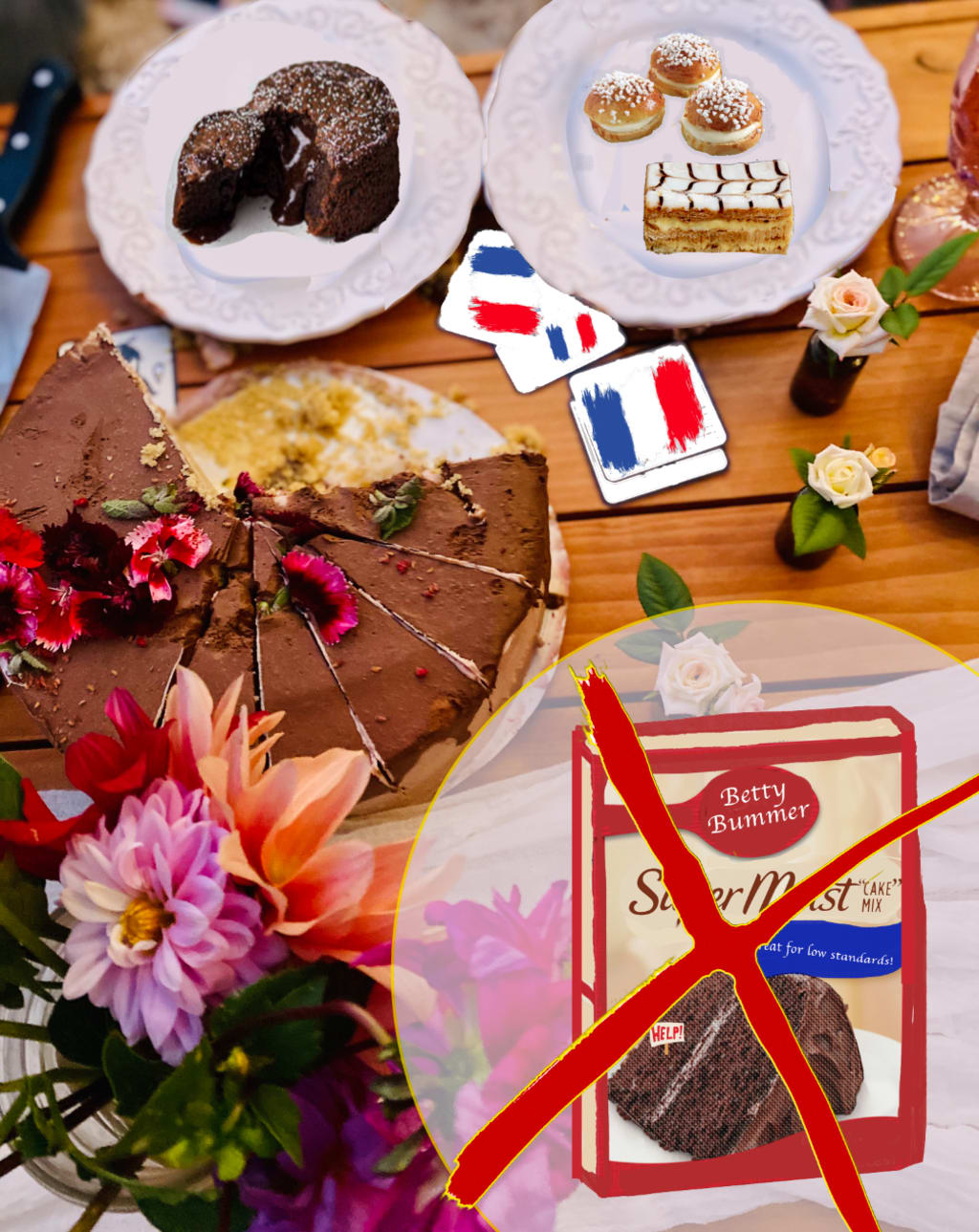The truth about this cake
How Americans sabotage their own celebrations

Showing up at an American birthday party as a French ex-pat living in America can be… a little difficult (to swallow); the cake that is. The hitch is that the French aren’t necessarily picky eaters, we just have standards.
But alas, I am standing in the room for Elena's 33rd birthday. The whole gang is here singing “Happy Birthday” perfectly out of tune as a friend walks down the dark hall illuminated by the sparkly birthday candles.
That’s when I take my first glance at the antagonist. There it is, the cake, now being placed centered on the dining table ready to be sliced and served. I should be excited. I want to be excited. Everyone’s plates are out, the napkins are being passed around… the problem is that – I know the truth about this cake…
This cake was invented in 1927 by a certain Harry Baker, an insurance agent from Los Angeles, who introduced a new recipe to make what he coined the “Chiffon Cake;” which he should have kept a secret – except he didn’t. Two decades after his invention, he shared the recipe with Betty Crocker, who then shared it with the rest of the United States in the form of millions of premade cake boxes. The secret to the airy light cake? Substitute vegetable oil (usually canola) instead of butter. Big mistake Betty. All baked goods take on the flavor of their fat component. Have you ever enjoyed spreading canola oil instead of butter on your morning toast? Or maybe some corn or soy oil on your mashed potatoes? No. So why would anyone willingly sabotage their cake with it? Yes, it was very popular when it came out, especially among celebrities in Hollywood, (who’s culinary preferences should not be trusted due to skewed appetites and singed taste bunds from the usage of various party drugs). If you ask me, chiffon cake became popular because it was different and because it was new, not because it was good. Don’t trust me on it? Then trust the name! “Chiffon” in French? Chiffon means rag. Rags are what you use to clean up your dirty kitchen, you’re not supposed to eat them!
I get passed a wooden disposable fork along with a paper plate where this excuse for a chocolate cake with way too many air bubbles lays. Natalia is standing next to me giving me the eye. As my best friend, she knows every single thought that has been going through my head and she is eager to put me on the spot and make me the joke of the party. I’m thinking of just passing my plate over to Byron, he will gladly eat my slice of cake without anyone noticing, but I’m hungry! Should I risk my palate over peer pressure? Frustration starts to flood me; all I want is a slice of real cake! It’s all I want. And I can’t have it, because this is America, land of the free-from-flavor cake and home of the brave enough to eat it anyway! I take a bite and squint. An unpleasant film sets on my tongue.
Cake should not have an unpleasant aftertaste. Why does it? I will use pizza as an example to paint the picture. Before I moved to the USA, I had never seen anyone use a napkin to soak the excess oil off their pizza. Come to find out it is because poor quality ingredients sweat, producing excess oils in the cooking process. Does anyone in Italy or France dry off their pizza with paper before eating it? We do not have to.
The aftertaste settles and my teeth are going numb. In my head I can hear the voice of a proud American yelling out, “If you don’t like it then go home!” I’ll go home when you stop repeatedly making France the most visited country in the world. Proof our bakeries are so good, they can lure you in from across the Atlantic Ocean!
Natalia doesn’t skip a beat “Alexis! Get over it, it’s not that bad!”
Now everyone is starring.
I could have avoided this situation, had I just managed my time better and made a real chocolate cake. Maybe even my aunt’s famous Moelleux au Chocolat recipe with the half-baked molten chocolate center. The perfect balance of richness and lightness, smooth velvety texture, and the aroma of bitter chocolate that is balanced by the perfect amount of sweetness. Egyptians may have invented the first cake, but the French perfected it. The French love cake so much, we have bakeries and pastry shops on every other street corner. Never would you have to walk more than ten minutes in any direction to get a personal portion of cake of any shape or flavor. That is because the cake in France is so delicious that we cannot live without its close proximity. Fresh berries on a thin well-textured crust, vanilla bean cream fillings, hazelnut puree centers, pistachio sprinkles, flat, round, square, shiny, matte – there is a cake for all taste preferences yet one thing is for sure, no matter which one you choose none of them will not taste like a chiffon cake.
I could have impressed the crowd with the culinary masterpiece that is a well-made chocolate cake with whipped eggs slowly folded into a warm cocoa and butter mix. But no… I wanted to have my cake (come empty-handed) and eat it too.
To American cake’s defense, what of anything that has ever been inspired by the French makes sense in the US? Even the above expression doesn’t make sense in English, “Have your cake and eat it too”?
The actual French expression it is inspired by translates to “You want the butter and the money to pay for the butter,” which in short means, “You want free butter!” But the English translation? Obviously, if it’s my cake, I’m going to eat it! How is that supposed to reflect a compromise?
Since we are here clarifying French expressions, I will let you know what Queen Marie Antoinette really meant to say when she announced, “Let them eat cake.” The translation implies a mockery, but a mockery it was not. Rather, she suggested a solution. When her servants announced the French people were revolting, she asked, why? The reply: The people are hungry because there is no more bread. She couldn’t quite understand it because of the abundance surrounding her at every meal, so she offered a well-meaning compromise “If there is no more bread, then give them cake!” This seemed logical to her because she had access to a lot of both. This does not imply that she was stupid. It just showcases that she was ignorant. The same ignorance Harry Baker had when he ran out of time to make a decent cake and threw poor quality oil in the batter. The same ignorance that has caused millions of influenceable young Americans to believe that if they followed Betty’s instructions on the back of the red-framed box, it would give them a cake worthy of celebratory confetti. But they are wrong. And so, if you learn anything from the French, it is that you should pay for the butter, put it in your cake, and share it with your friends because they will love you for it.
I can’t explain this to everyone at the party. I already told Natalia many times and she confirmed to me that not only do I sound like a nerd, I also sound like a (cake) snob. I swallow my bite of cake and flash a big smile. I then lift my fork to the sky and shout out with enthusiasm to the crowd: Bon appétit!
Meaning, “Have a good appetite”— you’re going to need it.
About the Creator
Enjoyed the story? Support the Creator.
Subscribe for free to receive all their stories in your feed. You could also pledge your support or give them a one-off tip, letting them know you appreciate their work.






Comments
There are no comments for this story
Be the first to respond and start the conversation.